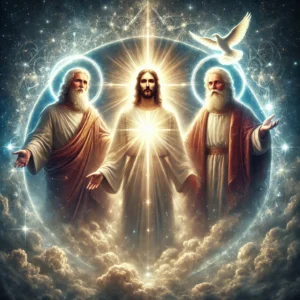
The concept of the Trinity is one of the most profound and complex doctrines in Christian theology. It defines God as three distinct persons—the Father, Son, and Holy Spirit—who are of the same essence, co-equal and co-eternal. At the heart of this mystery is the role of Jesus Christ, the Divine Son, whose life, death, and resurrection are central to the Christian faith. Let’s explore the role of Jesus within the Trinity and how his unique position as the Son of God shapes our understanding of the divine nature.
The Trinity: One God, Three Persons
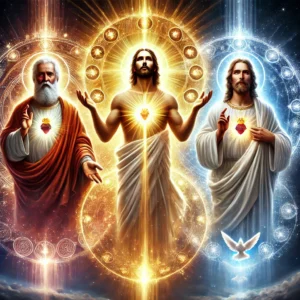
At its core, the Trinity emphasizes that God is one being in three persons: the Father, the Son (Jesus), and the Holy Spirit. While each person of the Trinity is distinct in their roles and relationships, they are unified in their divine nature. This concept is key to understanding how Christians view God’s interaction with the world. The Father is often seen as the Creator, the Son as the Redeemer, and the Holy Spirit as the Sustainer. Yet, all three work together in perfect harmony, revealing different aspects of God’s nature.
Jesus as the Divine Son

Within the Trinity, Jesus holds the title of the Son of God, a role that emphasizes his unique relationship with the Father. Christians believe that Jesus is both fully divine and fully human, a mystery often referred to as the hypostatic union. As the Second Person of the Trinity, Jesus is co-eternal with the Father and the Holy Spirit, meaning he has always existed and was not created. This divine status is crucial to understanding his role in salvation, as only someone fully divine could atone for the sins of humanity.
Jesus’ Role in Creation
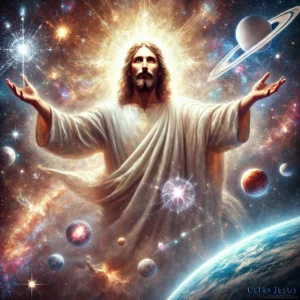
Though Jesus is often associated with salvation, his role in creation is also significant. According to John 1:1-3, “In the beginning was the Word, and the Word was with God, and the Word was God… Through him all things were made.” Jesus, referred to as the Logos (the Word), is portrayed as the active agent in creation. This passage affirms that Jesus participated in the creation of the universe, further underscoring his divinity and eternal existence.
Jesus as the Redeemer: The Sacrificial Lamb
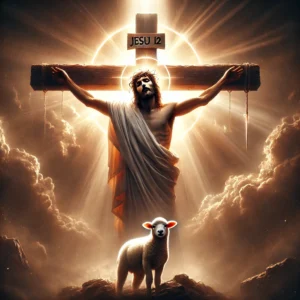
One of the most critical aspects of Jesus’ role within the Trinity is his role as the Redeemer of humanity. Christians believe that through Jesus’ sacrificial death on the cross, he took on the sins of the world, offering humanity salvation and reconciliation with God. This act of redemption highlights his unique position as the Lamb of God, willingly giving his life to restore the broken relationship between humanity and the divine.
In his resurrection, Jesus demonstrated his victory over death, confirming his divine authority and the promise of eternal life for believers. As the Son of God, Jesus’ resurrection also reveals the power of the Trinity in conquering sin and death, showcasing the ultimate harmony between the Father, Son, and Holy Spirit in the work of salvation.
The Mediator Between God and Humanity
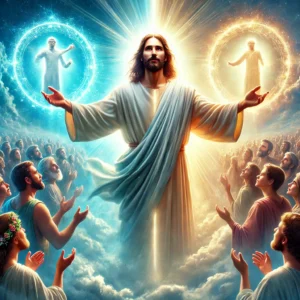
As both fully God and fully human, Jesus plays the unique role of mediator between God and humanity. In 1 Timothy 2:5, it states, “For there is one God and one mediator between God and mankind, the man Christ Jesus.” His dual nature allows him to bridge the gap between the divine and human realms, offering access to God and providing a way for believers to be reconciled with the Father. Through Jesus, Christians are invited into a personal relationship with God, with the assurance that he understands the struggles and temptations of human life.
Jesus and the Holy Spirit: Empowering Believers
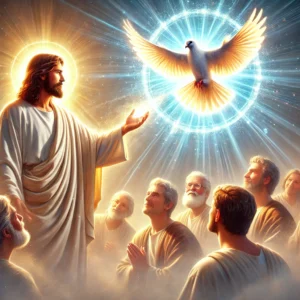
While Jesus’ earthly ministry ended with his ascension into heaven, his role continues through the work of the Holy Spirit. Jesus promised his followers that after his departure, the Holy Spirit would come to guide, comfort, and empower them. The Holy Spirit, the Third Person of the Trinity, carries on the work of Jesus by indwelling believers, enabling them to live out their faith and fulfill God’s purposes. This connection between Jesus and the Spirit highlights the unity of the Trinity, as each person plays a distinct but interconnected role in the lives of believers.
Jesus’ Eternal Reign: The King of Kings
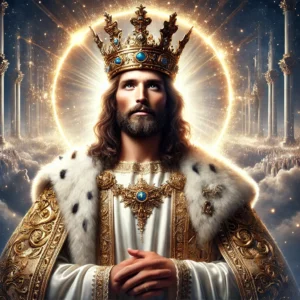
Jesus is not only the Redeemer but also the King of Kings who will reign eternally. According to Christian eschatology, Jesus will return at the end of time to establish his kingdom in its fullness. His role as the divine Son assures believers of his sovereign power over all creation and his ultimate victory over evil. This future reign is a crucial element of his role in the Trinity, demonstrating that Jesus’ kingship extends beyond his earthly life to an eternal reign alongside the Father and the Holy Spirit.
Conclusion
Jesus’ role in the Trinity is both complex and profound. As the Divine Son, he is central to the Christian understanding of God, acting as the Redeemer, Mediator, Creator, and eternal King. His life and ministry reveal the loving and redemptive nature of God, offering a way for humanity to be restored to a relationship with the Father through the power of the Holy Spirit. The mystery of the Trinity, with Jesus at its heart, continues to inspire awe and devotion, drawing believers deeper into the richness of the divine.



